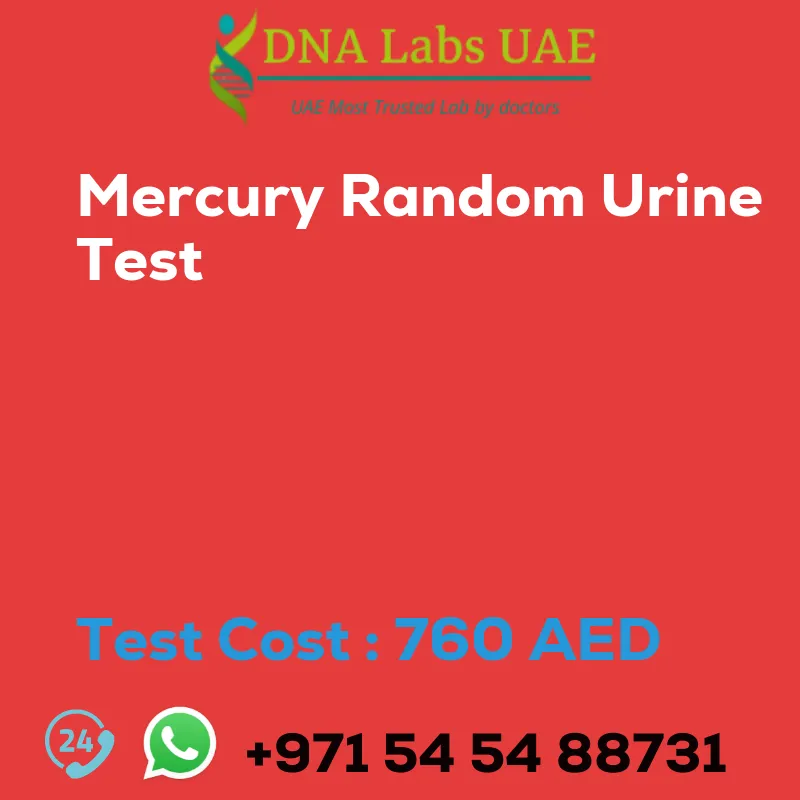MERCURY RANDOM URINE Test Cost AED: 760.0
At DNA Labs UAE, we offer the Mercury Random Urine Test at a cost of AED 760.0. This diagnostic test is used to measure the levels of mercury in a person’s urine. Mercury, a heavy metal, can be found in various sources such as certain types of fish, dental fillings, and occupational exposure.
The test is primarily performed to assess the level of mercury exposure in individuals working in industries where mercury is commonly used, such as mining, dentistry, or chemical manufacturing. It can also be used to evaluate individuals who may have been exposed to mercury through contaminated food or environmental sources.
Test Details
To conduct the Mercury Random Urine Test, a random urine sample is collected from the individual. The urine sample should be a 10 mL (5 mL minimum) aliquot collected in an acid-washed (metal-free) container available from LPL. It is recommended to ship the sample refrigerated or frozen. During specimen collection, the patient should avoid eating predatory fish like Swordfish, Tuna, and Shark at least 3 days prior. Powderless gloves should be used.
Report Delivery
The sample is delivered daily by 6 pm, and the report is available the next day.
Method and Test Type
The Mercury Random Urine Test is conducted using the ICPMS (Inductively Coupled Plasma Mass Spectrometry) method. It falls under the category of Industrial Diseases.
Test Department and Doctor
The test is conducted in the Atomic Absorption department and can be requested by a physician.
Pre Test Information
Prior to specimen collection, the patient should avoid eating predatory fish like Swordfish, Tuna, and Shark for at least 3 days. If Gadolinium or Iodine-containing contrast media has been administered, the specimen should not be collected for 96 hours.
Interpreting the Results
The Mercury Random Urine Test provides valuable information about an individual’s mercury exposure. However, it is important to note that this test is just one method of assessing mercury exposure and should be interpreted in conjunction with other clinical and laboratory findings. The test does not provide information about the specific source of mercury exposure or the potential health effects associated with it.
If you suspect mercury exposure or have concerns about your mercury levels, it is recommended to consult with a healthcare professional. They can guide you through the appropriate testing and provide further advice and treatment if necessary.
| Test Name | MERCURY RANDOM URINE Test |
|---|---|
| Components | |
| Price | 760.0 AED |
| Sample Condition | 10 mL (5 mL min.) aliquot of random urine collected in an acid washed (metal free) container available from LPL. Ship refrigerated or frozen. Patient should avoid eating predatory fish like Sword fish,Tuna and shark atleast 3 days prior to specimen collection. Use powderless gloves during specimen collection. |
| Report Delivery | Sample Daily by 6 pm; Report Next day |
| Method | ICPMS |
| Test type | Industrial diseases |
| Doctor | Physician |
| Test Department: | ATOMIC ABSORPTION |
| Pre Test Information | Patient should avoid eating predatory fish like Sword fish, Tuna and shark atleast 3 days prior to specimen collection. If Gadolinium or Iodine containing contrast media has been administered, specimen should not be collected for 96 hours. |
| Test Details |
The Mercury Random Urine Test is a diagnostic test used to measure the levels of mercury in a person’s urine. Mercury is a heavy metal that can be found in various sources, such as certain types of fish, dental fillings, and occupational exposure. The test is usually performed to assess the level of mercury exposure in individuals who work in industries where mercury is commonly used, such as mining, dentistry, or chemical manufacturing. It can also be used to evaluate individuals who may have been exposed to mercury through contaminated food or environmental sources. To conduct the test, a random urine sample is collected from the individual. The urine is then analyzed in a laboratory to measure the concentration of mercury present. The results of the test can help determine if the individual has been exposed to excessive levels of mercury and if further action, such as medical treatment or workplace safety measures, is necessary. It is important to note that the Mercury Random Urine Test is just one method of assessing mercury exposure and should be interpreted in conjunction with other clinical and laboratory findings. Additionally, this test does not provide information about the specific source of mercury exposure or the potential health effects associated with it. If you suspect mercury exposure or have concerns about your mercury levels, it is recommended to consult with a healthcare professional who can guide you through the appropriate testing and provide further advice and treatment if necessary. |








